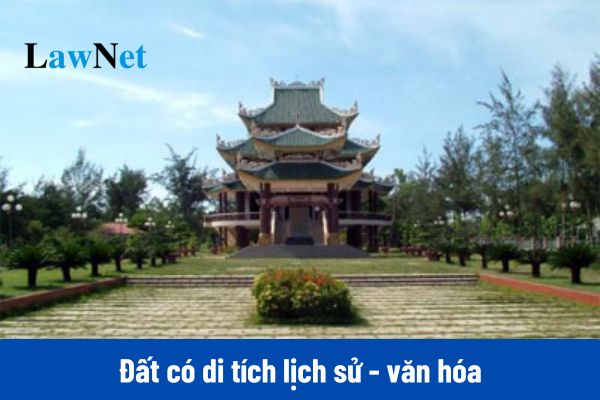When is land with historical and cultural relics or scenic places exempt from non-agricultural land use tax in Vietnam?
When is land with historical and cultural relics or scenic places exempt from non-agricultural land use tax in Vietnam?
Pursuant to Point c, Clause 1, Article 3 of Decree 53/2011/ND-CP, it is stipulated as follows:
Exempt Objects
Non-agricultural land not used for business purposes prescribed in Article 3 of the Law on Non-Agricultural Land Use Tax is exempt from tax, specifically:
- Land used for public purposes includes:
a) Land for transportation, irrigation including land used for building infrastructure such as roads, bridges, culverts, sidewalks, railways, land for constructing airport, seaport infrastructure, including land within the planning zone for airport, seaport construction but has not yet been developed due to phased investment approved by a competent state agency, and land for water supply systems (excluding water production plants), drainage systems, irrigation works, dikes, dams, and land within the protection corridors for transport, irrigation safety;
b) Land for constructing cultural, medical, educational and training, sports facilities serving public interests, including land used for kindergartens, schools, hospitals, markets, parks, gardens, playgrounds for children, squares, cultural works, commune-level postal and cultural points, monuments, memorial steles, museums, rehabilitation facilities for the disabled, vocational training institutions, drug rehabilitation centers, reformatory camps, rehabilitation camps; care centers for the elderly and children in difficult circumstances;
c) land with historical and cultural relics or scenic places that have been ranked or decided to be protected by the People's Committee of a province, centrally-run city (hereinafter referred to as the provincial People's Committee);
d) Land for constructing other public works including land for public purposes in urban areas, rural residential areas; land for constructing shared infrastructure in industrial zones, high-tech zones, economic zones as planned by the competent authority; land for constructing electricity transmission systems, telecommunications networks, gasoline, oil, gas pipelines, and land under the protection corridors of these works; land for substations; land for reservoirs, hydroelectric dams; land for funeral homes, crematoria; land for waste disposal, landfills, waste treatment areas permitted by competent state agencies.
...
Therefore, land with historical and cultural relics or scenic places are not subject to the non-agricultural land use tax provided that the land is not used for business purposes and has been ranked or decided to be protected by the provincial People's Committee.

When is land with historical and cultural relics or scenic places exempt from non-agricultural land use tax in Vietnam? (Image from the Internet)
Is residential land in disadvantaged rural areas subject to non-agricultural land use tax in Vietnam?
According to Clause 1, Article 2 of Decree 53/2011/ND-CP guiding the Law on Non-Agricultural Land Use Tax, it is stipulated as follows:
Taxable Objects
Non-agricultural land use taxation applies to provisions in Article 2 of the Law on Non-Agricultural Land Use Tax. To be specific, as follows:
1. Urban residential land, homestead land in rural areas:
- Non-agricultural production, business land specified in Clause 2, Article 2 of the Law on Non-Agricultural Land Use Tax, includes:
a) Land for constructing industrial parks including land for constructing industrial complexes, industrial zones, export processing zones, and other centralized production, business areas with similar land use policies;
b) Land for constructing production, business facilities including land for industrial, handicraft production facilities; building commercial, service business facilities, and other works for production, business (including land as a base for constructing production, business facilities in high-tech zones, economic zones);
c) Land for mineral extraction, land for mineral processing sites, except for mineral extraction that does not affect the topsoil or ground surface;
d) Land for producing building materials, ceramics including land for raw material extraction and land for processing, producing building materials, ceramics.
- Non-agricultural land specified in Article 3 of this Decree used by organizations, households, individuals for business purposes.
Thus, homestead land in rural areas, regardless of whether it is in difficult areas or not, is subject to non-agricultural land use tax.
What type of land used for national defense and security purposes is exempt from non-agricultural land use tax in Vietnam?
Based on Clause 7, Article 3 of Decree 53/2011/ND-CP, it is stipulated that types of land used for national defense and security purposes are exempt from non-agricultural land use tax, including:
- Land within barracks, military headquarters;
- Land for military bases;
- Land for national defense works, battlefields, and special projects on defense, security;
- Land for military stations, ports;
- Land for industrial, scientific and technological works directly serving defense, security;
- Land for warehouses of armed forces units;
- Land for shooting ranges, training fields, practice grounds, weapon testing grounds, weapon destruction grounds;
- Land for guesthouses, official residences, gyms, and other facilities within the premises of military units' barracks, headquarters;
- Land for detention centers, temporary detention centers, temporary holding cells, educational facilities, reformatory schools managed by the Ministry of Defense, Ministry of Public Security;
- Land for constructing combat works, other defense, security service works as stipulated by the Government of Vietnam.

